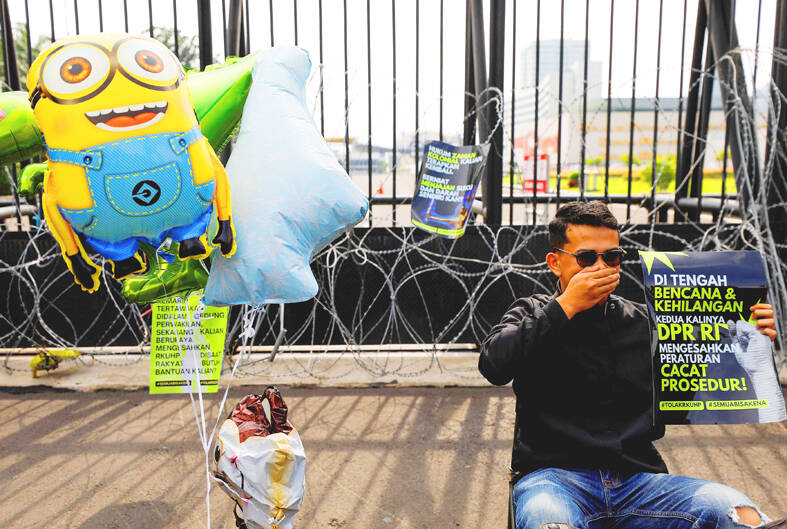The Indonesian People’s Consultative Assembly yesterday passed a long-awaited and controversial revision of its penal code that criminalizes extramarital sex for citizens and visiting foreigners alike.
After ratification, the new criminal code must be signed by the president, Indonesian Deputy Minister of Law and Human Rights Edward Omar Sharif Hiariej said.
The criminal code does not apply immediately.

Photo: Reuters
He said the new law “has a lot of implementing regulations that must be worked out, so it’s impossible in one year,” but takes a maximum of three years to transition from the old code to the new one.
A copy of the amended criminal code obtained by The Associated Press includes several revised articles that make sex outside marriage punishable by a year in jail and cohabitation by six months, but adultery charges must be based on police reports lodged by their spouse, parents or children.
It also says the promotion of contraception and religious blasphemy are illegal, and it restores a ban on insulting a sitting president and vice president, state institutions and national ideology. Insults to a sitting president must be reported by the president and can lead to up to three years in jail.

Photo: Reuters
Hiariej said the government provided “the strictest possible explanation that distinguishes between insults and criticism.”
The code maintains that abortion is a crime, but it adds exceptions for women with life-threatening medical conditions and for rape, provided that the fetus is less than 12 weeks old, in line with what is already regulated in the 2004 Medical Practice Act.
Rights groups criticized some of the revisions as overly broad or vague and warned that rushing them into the new criminal code could penalize normal activities and threaten freedom of expression and privacy rights.
However, some advocates hailed it as a victory for the country’s LGBTQ minority. Lawmakers during a fierce deliberation session eventually agreed to repeal an article proposed by Islamic groups that would have made gay sex illegal.
The code would also preserve the death penalty within the criminal justice system despite calls from the National Commission on Human Rights and other groups to abolish capital punishment, as dozens of other countries have done.
The new code says the death penalty is imposed alternatively with a probationary period. This means a judge cannot immediately impose a death sentence. If within a period of 10 years the convict behaves well, then the death penalty is changed to life imprisonment or 20 years’ imprisonment.
The code also expands the blasphemy law and maintains a five-year prison term for deviations from the central tenets of Indonesia’s six recognized religions: Islam, Protestantism, Catholicism, Hinduism, Buddhism and Confucianism. Citizens face a 10-year sentence under the bill for associating with organizations that follow Marxist-Leninist ideology and a four-year sentence for spreading communism.
Human Rights Watch yesterday said that laws penalizing criticism of public leaders are contrary to international law, and that some forms of expression are considered insulting is not sufficient to justify restrictions or penalties.
“The danger of oppressive laws is not that they’ll be broadly applied, it’s that they provide avenue for selective enforcement,” said Andreas Harsono, a senior Indonesia researcher at the group.
Many hotels, including in tourism areas like Bali and metropolitan Jakarta, will risk losing their visitors, he added.
“These laws let police extort bribes, let officials jail political foes, for instance, with the blasphemy law,” Harsono said.

The Chinese People’s Liberation Army (PLA) is constructing a new counter-stealth radar system on a disputed reef in the South China Sea that would significantly expand its surveillance capabilities in the region, satellite imagery suggests. Analysis by London-based think tank Chatham House suggests China is upgrading its outpost on Triton Island (Jhongjian Island, 中建島) on the southwest corner of the Paracel Islands (Xisha Islands, 西沙群島), building what might be a launching point for an anti-ship missile battery and sophisticated radar system. “By constraining the US ability to operate stealth aircraft, and threaten stealth aircraft, these capabilities in the South China Sea send

HAVANA: Repeated blackouts have left residents of the Cuban capital concerned about food, water supply and the nation’s future, but so far, there have been few protests Maria Elena Cardenas, 76, lives in a municipal shelter on Amargura Street in Havana’s colonial old town. The building has an elegant past, but for the last few days Maria has been cooking with sticks she had found on the street. “You know, we Cubans manage the best we can,” she said. She lives in the shelter because her home collapsed, a regular occurrence in the poorest, oldest parts of the beautiful city. Cuba’s government has spent the last days attempting to get the island’s national grid functioning after repeated island-wide blackouts. Without power, sleep becomes difficult in the heat, food

Botswana is this week holding a presidential election energized by a campaign by one previous head-of-state to unseat his handpicked successor whose first term has seen rising discontent amid a downturn in the diamond-dependent economy. The charismatic Ian Khama dramatically returned from self-exile six weeks ago determined to undo what he has called a “mistake” in handing over in 2018 to Botswanan President Mokgweetsi Masisi, who seeks re-election tomorrow. While he cannot run as president again having served two terms, Khama has worked his influence and standing to support the opposition in the southern African country of 2.6 million people. “The return of

Ukrainian President Volodymyr Zelenskiy has rejected a plan for the UN Secretary-General Antonio Guterres to visit Kyiv due to Guterres’ attendance at this week’s BRICS summit in Russia, a Ukrainian official said on Friday. Kyiv was enraged by Guterres’ appearance at the event in the city of Kazan on Thursday and his handshake with its host, Russian President Vladimir Putin, whose forces invaded Ukraine on Feb. 24, 2022. Guterres, who called for a “just peace” in Ukraine at the BRICS event and has repeatedly condemned the invasion, discussed a visit to Ukraine with Zelenskiy when they met in New York